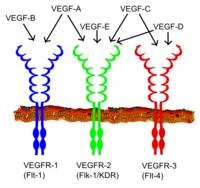
Photo from wikipedia
More than any other organ, the heart is particularly sensitive to gene expression deregulation, often leading in the long run to impaired contractile performances and excessive fibrosis deposition progressing to… Click to show full abstract
More than any other organ, the heart is particularly sensitive to gene expression deregulation, often leading in the long run to impaired contractile performances and excessive fibrosis deposition progressing to heart failure. Recent investigations provide evidences that the protein phosphatases (PPs), as their counterpart protein kinases, are important regulators of cardiac physiology and development. Two main groups, the protein serine/threonine phosphatases and the protein tyrosine phosphatases (PTPs), constitute the PPs family. Here, we provide an overview of the role of PTP subfamily in the development of the heart and in cardiac pathophysiology. Based on recent in silico studies, we highlight the importance of PTPs as therapeutic targets for the development of new drugs to restore PTPs signaling in the early and late events of heart failure.
Journal Title: Heart Failure Reviews
Year Published: 2018
Link to full text (if available)
Share on Social Media: Sign Up to like & get
recommendations!